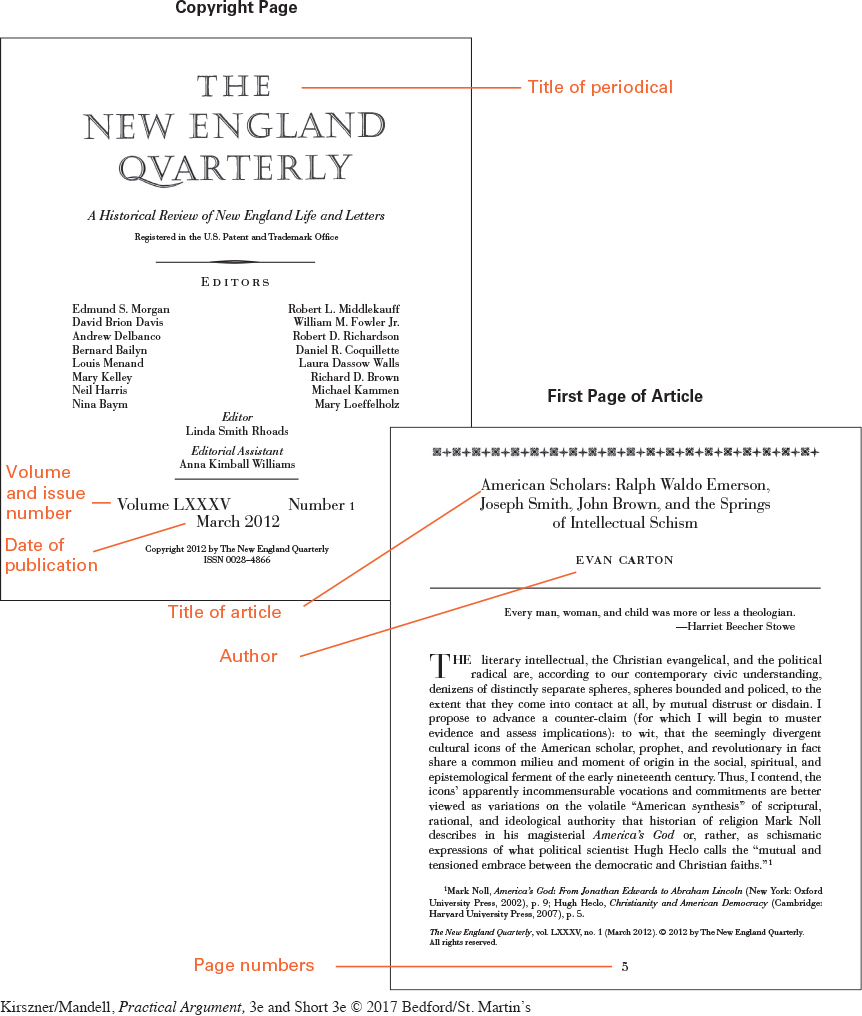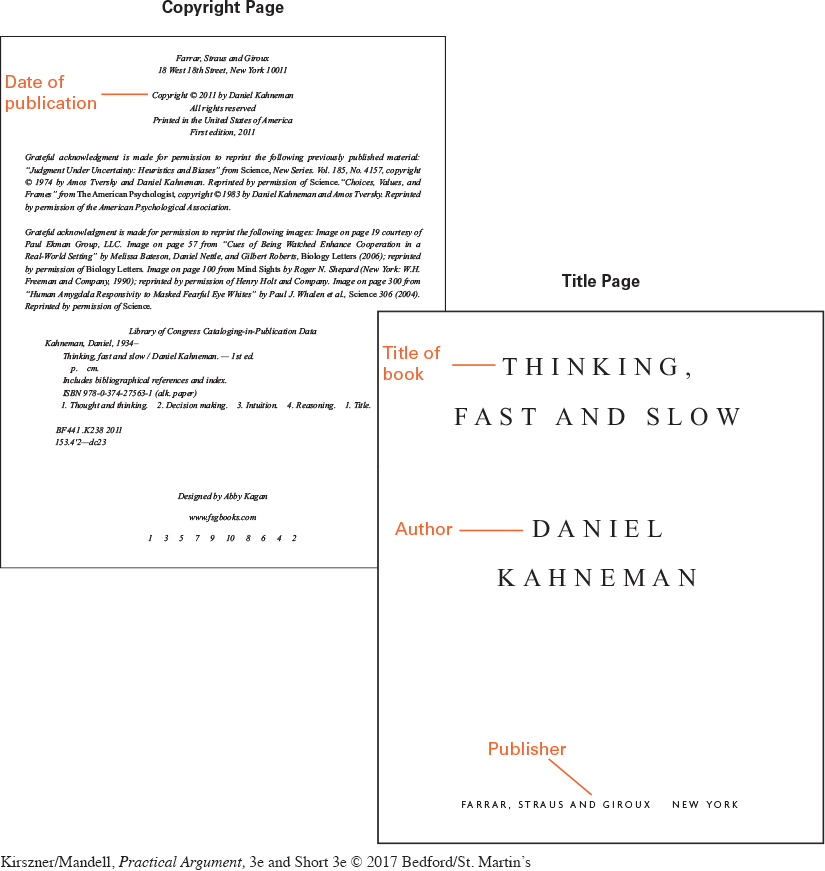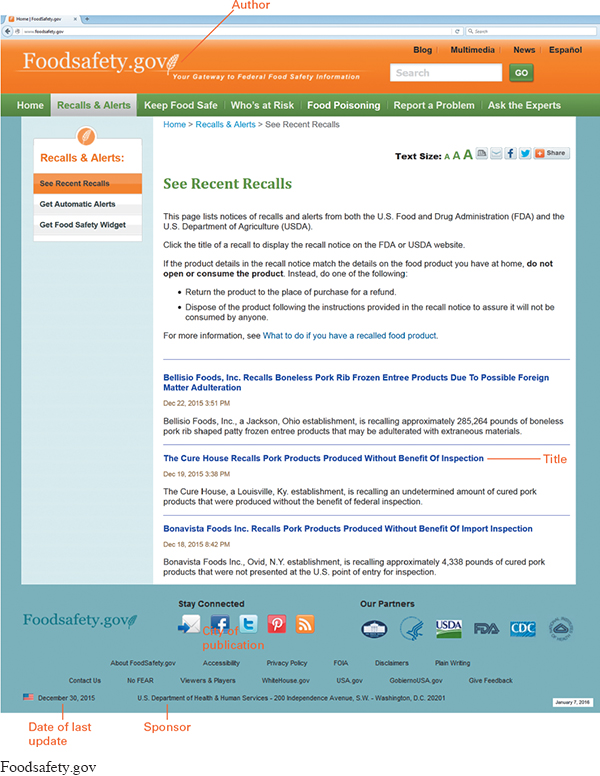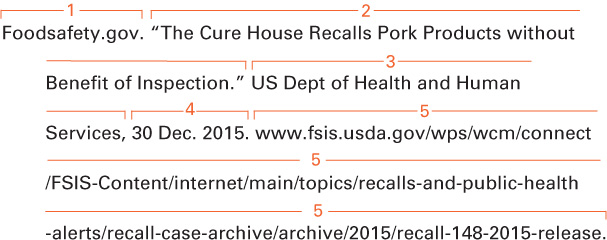Preparing the Works-Cited List
Start your works-
Here are some additional guidelines:
Italicize all book and periodical titles.
Use a short version of a publisher’s name (Penguin rather than Penguin Books), and abbreviate University Press (as in Princeton UP or U of Chicago P).
If you are listing more than one work by the same author, include the author’s name in the first entry, and substitute three unspaced hyphens followed by a period for the second and subsequent entries.
Put quotation marks around the title of a periodical article or a section of an edited book or anthology, and provide the inclusive page numbers: 44–
99. For page numbers larger than 99, give the last two digits of the second number if the first is the same: 147– 69 (but 286– 301).
When you have completed your list, double-
The following models illustrate the most common kinds of references.
Periodicals
For periodical articles found online or through a full-
Page 348
Guidelines for Citing a Periodical Article
To cite a print article in MLA style, include the following:
Author, last name first
Title of the article, in quotation marks
Title of the periodical, in italics
Volume and issue numbers
Date or year of publication
Page number(s) of the article
(See images below.)

Journals
Journals are periodicals published for experts in a field. Cite both volume number and issue number when available. In cases where only an issue number is available, cite just the issue.
Minkler, Lanse. “Economic Rights and Political Decision-
Picciotto, Joanna. “The Public Person and the Play of Fact.” Representations, no. 105, 2009, pp. 85–
Magazines
Magazines are periodicals published for a general audience. Do not include a magazine’s volume and issue number, but do include the date (day, month, and year for weekly publications; month and year for those published less frequently). If pages are not consecutive, give the first page followed by a plus sign.
Aviv, Rachel. “The Death Treatment.” The New Yorker, 22 June 2015, pp. 56–
Rice, Andrew. “Mission from Africa.” The New York Times Magazine, 12 Apr. 2009, pp. 30+.
Page 349

Page 350
Newspapers
Include both the letter of the section and the page number. If an article continues on to a nonconsecutive page, give just the first page followed by a plus sign.
Darlin, Damon. “Software That Monitors Your Work, Wherever You Are.” The New York Times, 12 Apr. 2009, pp. B2+.
Editorial, Letter to the Editor, or Review
Include authors and titles where available as well as a descriptive label—
Bernath, Dan. “Letter to the Editor.” The Washington Post, 12 Apr. 2009, p. A16. Letter.
Franklin, Nancy. “Whedon’s World.” Review of Dollhouse, directed by Joss Whedon. The New Yorker, 2 Mar. 2009, p. 45.
“World Bank Responsibility.” The Wall Street Journal, 28 Mar. 2009, p. A10. Editorial.
Political Cartoon or Comic Strip
Include the author and title (if available) of the cartoon or comic strip, followed by a descriptive label and publication information.
Adams, Scott. “Dilbert.” The Chicago Tribune, 10 Mar. 2012, p. C9. Comic strip.
Pett, Joel. Lexington Herald-
Advertisement
Cite the name of the product or company that is advertised, followed by the descriptive label and the publication information.
Maxwell House. Rolling Stone, 18 June 2015, p. 35. Advertisement.
Books
Guidelines for Citing a Book
To cite a book in MLA style, include the following:
Author, last name first
Title, in italics
Page 351
Full publisher’s name
Date of publication

Page 352
Book by One Author
List the author, last name first, followed by the title (italicized). Include the full publisher’s name, abbreviated when called for, and end with the date of publication.
Skinner, Quentin. Forensic Shakespeare. Oxford UP, 2014.
Book by Two Authors
List authors in the order in which they are listed on the book’s title page. List the first author with last name first, but list the second author with first name first.
Singer, Peter, and Jim Mason. The Way We Eat: Why Our Food Choices Matter. Rodale, 2006.
Book by Three or More Authors
List only the first author, last name first, followed by the abbreviation et al. (“and others”).
Gould, Harvey, et al. Advanced Computer Simulation Methods. Pearson Education, 2009.
Two or More Books by the Same Author
List the entries alphabetically by title. In each entry after the first, substitute three unspaced hyphens, followed by a period, for the author’s last name.
Friedman, Thomas L. Hot, Flat, and Crowded: Why We Need a Green Revolution—
---. The World Is Flat: A Brief History of the Twenty-
Edited Book
If your focus is on the author, include the name of the editor (or editors) after the title, preceded by the abbreviation Ed. (for “edited by”). If the book is an edited collection of essays by different authors, treat it as an anthology.
Whitman, Walt. The Portable Walt Whitman. Edited by Michael Warner, Penguin Classics, 2004.
Page 353
If your focus is on the editor, begin with the editor’s name followed by editor or editors.
Michael Warner, editor. The Portable Walt Whitman. Penguin Classics, 2004.
Translation
Bolaño, Roberto. The Savage Detectives. Translated by Natasha Wimmer, Picador, 2008.
Revised Edition
Smith, Steven S., et al., The American Congress. 4th ed., Cambridge UP, 2006.
Anthology
Include the name of the editor (or editors) of the anthology, followed by editor or editors.
Browning, John Edgar, and Caroline Joan S. Picart, editors. Speaking of Monsters, Palgrave, 2012.
Work in an Anthology
Malone, Dan. “Immigration, Terrorism, and Secret Prisons.” Keeping Out the Other: Immigration Enforcement Today, edited by David C. Brotherton and Philip Kretsedemas, Columbia UP, 2008, pp. 44–
More Than One Work in the Same Anthology
To avoid repeating the entire anthology entry, you may provide a cross-
Adelson, Glenn et al., editors. Environment: An Interdisciplinary Anthology, Yale UP, 2008.
Lesher, Molly. “Seeds of Change.” Adelson, pp. 131–
Marshall, Robert. “The Problem of the Wilderness.” Adelson, pp. 288–
Page 354
Section or Chapter of a Book
Leavitt, Steven D., and Stephen J. Dubner. “Why Do Drug Dealers Still Live with Their Moms?” Freakonomics: A Rogue Economist Explores the Hidden Side of Everything, Morrow, 2006, pp. 49-
Introduction, Preface, Foreword, or Afterword
Christiano, Thomas, and John Christman. Introduction. Contemporary Debates in Political Philosophy. Edited by Thomas Christiano and John Christman, Wiley, 2009, pp. 1–
Multivolume Work
McNeil, Peter, editor. Fashion: Critical and Primary Sources. Berg Publishers, 2009. 4 vols.
Article in a Reference Work
A reference work is a book (print or electronic)—such as an encyclopedia, a dictionary, a bibliography, an almanac, or a handbook—
“Human Rights.” Encyclopedia Americana. 2003 ed.
“Seagrass Beds.” Ocean: A Visual Encyclopedia. DK Publishing, 2015.
NOTE
Keep in mind that many instructors do not consider encyclopedia articles acceptable research sources. Before including a citation for an encyclopedia article in your works-
Audiovisual Sources
TV Show
“A Desperate Man.” NCIS, written by Nicole Mirante-
Page 355
Film
The Tree of Life. Directed by Terrence Malick, performances by Brad Pitt, Sean Penn, and Jessica Chastain, Fox Searchlight, 2011.
Internet Sources
Citing Internet sources can be problematic because they sometimes lack basic information—
For sites that are online editions of printed works, include as much of the original print information as is available, as well as the URL.
For sites that exist only online, include (when available) the author, title, overall website title (if part of a larger project), the date it was last updated, and the URL.
For works that are accessed through a library database, include the name of the database (in italics) and the URL or Digital Object Identifier (DOI). A DOI is a unique series of numbers assigned to electronic documents. The DOI remains the same regardless of where on the Internet a document is located.
For particularly long URLs (three lines or greater), you may use the URL for the main website on which you found the content instead of the URL for the specific page which you are referencing. However, your instructor may not require a URL, so be sure to confirm their preference. It is always a good idea, however, to keep a record of the URLs for yourself in case you need to revisit your source.
If you type a URL into a works-
Guidelines for Citing a Website
To cite a website in MLA style, follow these guidelines:
Author (if any)
Title (if any)
Name of website or sponsor
Date the site was last updated
DOI or URL
Page 356

Page 357

Entire Website
Include (if available) the author, title of the website, date of last update, and the URL.
Document within a Website
“Uniform Impunity: Mexico’s Misuse of Military Justice to Prosecute Abuses in Counternarcotics and Public Security Operations.” Human Rights Watch, Apr. 2009, www.hrw.org/report/2009/04/29/uniform-
Online Video
Baggs, Amanda. “In My Language.” YouTube, 14 Jan. 2007, www.youtube.com/watch?v=JnylM1hI2jc.
Blog Posts and Blog Comments
Caryl, Christian. “Burma: How Much Change?” NYR Daily, NYREV, 17 Nov. 2015, www.nybooks.com/daily/2015/11/17/burma-
Cimons, Marlene. “Why Cities Could Be the Key to Solving the Climate Crisis.” Thinkprogress.org, Center for American Progress Action Fund, 10 Dec. 2015, thinkprogress.org/climate/2015/12/10/3730938/cities-
Tweet
Begin with the author’s real name, followed by the user name in parentheses. Include only the user name if the real name is unknown. Next, include the entire text of the tweet in quotation marks, followed by the date, the time, and the medium (Tweet).
Page 358
Curiosity Rover. “Can you see me waving? How to spot #Mars in the night sky: https://youtu.be/hv8hVvJlcJQ.” Twitter, 5 Nov. 2015, 11:00 a.m., twitter.com/marscuriosity/status/672859022911889408. Tweet.
Podcast
Koenig, Sarah. “The Alibi.” Serial, Chicago Public Radio, 3 Oct. 2014, serialpodcast.org/season-
Ogg, Erica. “Google Tries to Rehab Its Antitrust Image.” CNET News Daily Podcast, CBS Interactive, 8 May 2009, www.cnet.com/news/cnet-
Online Book
Doctorow, Cory. Content: Selected Essays on Technology, Creativity, Copyright, and the Future of the Future, Tachyon, 2008. Craphound.com.
Part of an Online Book
Zittrain, Jonathan L. “The Lessons of Wikipedia.” The Future of the Internet and How to Stop It, Yale UP, 2008. futureoftheinternet.org.
Article in an Online Scholarly Journal
Johnston, Rebecca. “Salvation or Destruction: Metaphors of the Internet.” First Monday, vol. 14, no. 4, 2009, firstmonday.org/article/view/2370/2158.
Magazine Article Accessed Online
Marantz, Andrew. “What to Do When Your App Is Racist.” The New Yorker, 29 Jul. 2015, www.newyorker.com/business/currency/what-
Newspaper Article Accessed Online
Possley, Maurice, and Ken Armstrong. “The Verdict: Dishonor.” Chicago Tribune, 11 Jan. 1999, www.chicagotribune.com/news/watchdog/chi-
Page 359
Article from a Library Database
Hartley, Richard D. “Sentencing Reform and the War on Drugs: An Analysis of Sentence Outcomes for Narcotics Offenders Adjudicated in the US District Courts on the Southwest Border.” Criminal Justice Policy Review, vol. 19, no. 4, 2008, pp. 414-
Legal Case
When citing a court opinion, provide the plaintiffs’ names, the legal citation (volume, abbreviation of the source, page numbers), the name of the court, the year of the decision, and any relevant information about where you found it. In many cases, online versions of the opinions will include only the first page; in those cases, supply that page number followed by a plus sign.
Miranda v. Arizona, 384 US 436+. Supreme Court of the US. 1966. FindLaw, Thompson Reuters, caselaw.findlaw.com/us-
Government Document
Include the government agency or body issuing the document, followed by publication information.
United States, Department of Homeland Security, Estimates of the Unauthorized Immigrant Population Residing in the United States, Office of Immigration Policy, Feb. 2009, www.dhs.gov/sites/default/files/publications/ois_ill_pe_2011_0.pdf.
For more practice, see the LearningCurve on Working with Sources (MLA) within this LaunchPad.
Page 360
MLA PAPER GUIDELINES
An MLA paper should have a one-
inch margin all around and be double- spaced. Indent the first line of every paragraph. Number all pages, including the first, consecutively. Type your name, followed by the page number, in the upper right-
hand corner. An MLA paper does not typically have a title page. Type the following information at the top of the paper, one inch from the left-
hand margin: Name
Instructor
Course
Date submitted
Center the title of the paper. Capitalize all important words of the title, except prepositions, articles, coordinating conjunctions, and the to in infinitives—
unless the word is the first or last word of the title. Titles should never be italicized, underlined, or followed by a period. Begin the works-
cited list on a new numbered page, after the body of the paper. (See page 347 for a discussion of the works-cited list.) Citations should follow MLA documentation style.